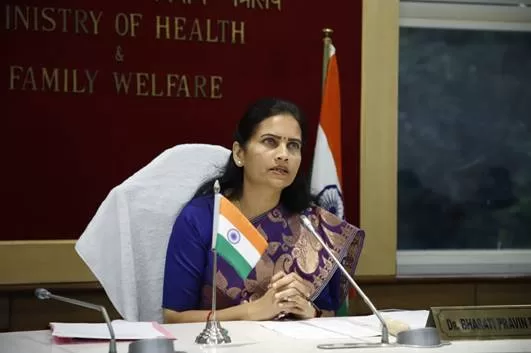
Dr. Bharati Pravin Pawar, Union Minister of State for Health and Family Welfare, underscored India’s firm stance on the necessity of a comprehensive strategy encompassing preventive measures, early intervention, and efficient management to mitigate the prevalence and impact of Non-Communicable Diseases (NCDs) on citizens’ well-being. She made this statement during her virtual address at the high-level panel discussion on “Scaling up Integration of NCDs in Primary Care” at the 2023 World Health Summit. Dr. Roderico H. Ofrin, WHO India Representative, was also in attendance. The overarching theme for this year’s World Health Summit is “A Defining Year for Global Health Action.”
Dr. Bharati Pravin Pawar highlighted India’s endeavors to combat non-communicable diseases, mentioning the launch of the 75/25 initiative. This initiative aims to screen and provide standard care for 75 million individuals with hypertension and diabetes by 2025, constituting the most extensive expansion of NCDs in primary healthcare worldwide. She further noted India’s visible progress in improving social indicators like life expectancy and maternal mortality rate, as well as NCDs, as evidenced by the inclusion of hypertension and diabetes treatment as output indicators in the Outcome Budget document of the Union Budget for 2023-2024. This inclusion reflects the government’s dedication to expanding coverage services for these conditions and underscores its commitment to addressing these health challenges.
Dr. Pawar emphasized that NCDs have emerged as a significant global health challenge necessitating immediate attention. The Government of India initiated the National Programme for Prevention and Control of Non-Communicable Diseases (NP-NCD) under the National Health Mission (NHM) in 2010, aiming to strengthen various aspects, including infrastructure, human resource development, health promotion, early diagnosis, management, and referral. She highlighted the Ayushman Bharat initiative, which translates policy intent into budgetary commitment, aligning with Sustainable Development Goals (SDGs) and Universal Health Coverage (UHC) objectives, emphasizing the commitment to ‘leave no one behind.’
Dr. Pawar also outlined specific initiatives by the Government of India in countering NCDs, such as Population-Based Screening (PBS) under Comprehensive Primary Health Care (CPHC) across Ayushman Bharat-Health and Wellness Centres. This targets individuals aged 30 and above for risk assessment and screening of common NCDs, including hypertension, diabetes, oral cancer, breast cancer, and cervical cancer. These services are delivered through trained frontline health workers, ensuring referral support and continuity of care throughout the healthcare delivery system. Additionally, e-Sanjeevani offers teleconsultation services for NCDs, overcoming barriers of geography, accessibility, cost, and distance.
Dr. Pawar emphasized that prevention and control of NCDs, as well as promoting healthy lifestyles, are pursued with a mission-oriented approach at all levels of healthcare delivery, in collaboration with both public and private sectors. Health & Wellness Centers focus not only on illness management but also on community wellness and well-being. Collaborations with other Union Ministries and Departments, such as the Ministry of Youth Affairs and Sports and the Ministry of Ayush, further support activities like the Fit India Movement and yoga-related initiatives.
Highlighting the role of technology in enhancing the delivery of healthcare services, Dr. Pawar pointed to digital health technology initiatives that have significantly improved NCD prevention and management. The National NCD portal serves as a critical tool for prevention, control, screening, and management of common NCDs. It captures primary-level information at public health facilities, facilitating reporting and monitoring of individual screening and treatment compliance. It also features a Single Longitudinal Health Record for each individual in the cloud, identified by a Unique Health ID (ABHA ID: Ayushman Bharat Health Account ID), ensuring data availability and continuity of care across facilities.
Dr. Bharati Pravin Pawar concluded by reaffirming India’s steadfast commitment to preventing and controlling NCDs and expressing deep appreciation for global efforts in this critical area. She emphasized the need for nations to collaborate and share successes, advocating for a unified approach to collectively address the challenges posed by NCDs. This collaborative effort reflects the broader ethos of unity and shared responsibility for the well-being of the global community.










